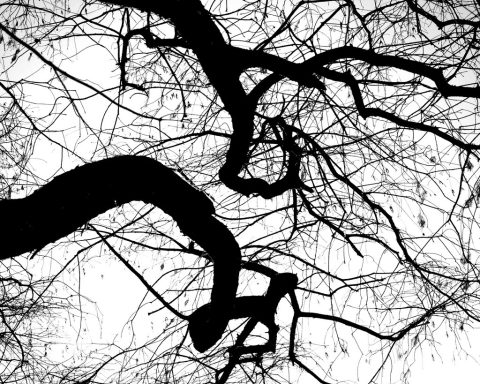Let’s begin with the first line of your story: “My therapist is pregnant and has mirrors for earrings.” Both features seem to alter her status in some way, at least in terms of how the narrator views her as “a professional,” though possibly in contradictory ways. Can you explain their significance to the main character?
I want to start off by saying: I’m not very bright or deep. While writing, I considered those images to be physical representations of taking a good look inside and outside oneself, I guess. I think the narrator is grasping onto these details because they’re so concrete and she envies what branding yourself as a “professional” can display or have the illusion of displaying—direction, understanding, confidence, all that. Pregnant women tend to have this enlightened look to them. It’s intimidating. So, I think my narrator’s worst nightmare is an acutely aware therapist who encourages critical examination.
Though the narrator spends the majority of the story interacting with her therapist, she does reference two other seemingly important figures from her life: her pastor from when she was nine and her former “other half.” All three relationships suffer from poor communication, and both the therapist and the pastor reinforce their authority over the narrator through oblique language. What do you consider to be the common thread among these three characters?
They all gave her some sort of structure, good or bad. The pastor told her what to think. The “other half” was a kind of validation that she’s a real person and capable of love. The therapist gives her very literal phrases to make sense of the world around her—“exactly” or “not exactly.” It’s easy to feel like you’re a stick figure and the people around you shape you into, like, a more complete drawing. But it’s important to leave some of the drawing to yourself, is my point. You should color yourself in.
Expanding on the previous question, the role of language within your story is particularly interesting. Throughout, questions go unanswered. Words are easily mistaken for others. Common objects are given new names. Multiple paragraphs begin with the narrator insisting that what she’s about to say is the truth, implying this has not been case elsewhere. What does this say about language’s ability to deceive?
Whenever you decide to convey something through language, there is a high chance that it will be diluted, inflated, or distorted in some way. I used to get upset when I couldn’t get language to do what I wanted it to do—to wrap my thoughts perfectly into a little bow. Now I’m more interested in the gaps and failures.
Because your story so effectively overlaps the past with the present, the focus lands squarely on the aftermath of the transformative events rather than on the events themselves. Is this a common strategy you employ? What is your general approach to writing flash fiction versus longer works?
I never plan on this, but I usually find myself writing around events—focusing more on the impact rather than on the event itself. A lot of my work is about avoidance. I consider myself an indecisive, quiet, and frantic person—so, naturally, I’m drawn to flash fiction. I enjoy the challenge of picking from all of the words in existence and collaging them to create something that will leave an impression and still only take, like, two minutes to read. It stresses me out in the best way. Flash gives me the restriction I need, but it also gives me the freedom to zoom in and really play with style. When I write flash I try to grab and hold onto my reader’s attention from the very beginning. With longer works it’s different because it’s kind of like You’re stuck with me for a while.
To wrap things up on a more personal note, which authors have had the most profound influence on your writing?
So many to name-drop here! Grace Paley changed something in my core. Amy Hempel, Tobias Wolff, Mary Gaitskill, Lucia Berlin, and others—I don’t want to make a super-long list. I’ve had really great professors, and I’m inspired by all of the work they’ve put out into the world. My friends, too. I enjoy reading anything that makes me feel like I’m camping in a tent: very exposed, connected, both large and small, face warmed by a flashlight.



 The core workshop of SmokeLong Fitness is all in writing, so you can take part from anywhere at anytime. We are excited about creating a supportive, consistent and structured environment for flash writers to work on their craft in a community. We are thrilled and proud to say that our workshop participants have won, placed, or been listed in every major flash competition. Community works.
The core workshop of SmokeLong Fitness is all in writing, so you can take part from anywhere at anytime. We are excited about creating a supportive, consistent and structured environment for flash writers to work on their craft in a community. We are thrilled and proud to say that our workshop participants have won, placed, or been listed in every major flash competition. Community works.